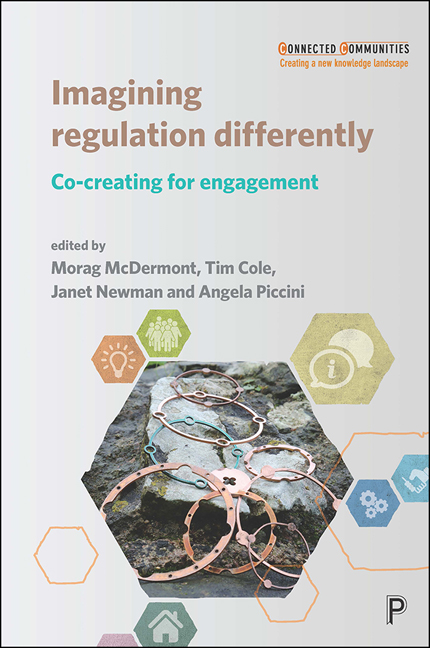Book contents
- Frontmatter
- Dedication
- Contents
- List of Figures, Tables and Boxes
- List of Abbreviations and Acronyms
- Notes on Contributors
- Acknowledgements
- Series Editors’ Foreword
- 1 Introduction: From the Regulation of Engagement to Regulating for Engagement
- 2 Co-Production as Experimentation: the Research Forum as Method
- Interlude: Community Researchers and Community Researcher Training
- 3 Beyond Prevent: Muslim Engagement in city Governance 49
- 4 Regulating for ‘care-ful’ knowledge Production: Researching Older People, Isolation and Loneliness
- 5 Who Gets to Decide what’s in my Fridge? Principles for Transforming the ‘Invisible Rules’ Shaping the Regulation of Food Habits in Urban Spaces
- 6 Life Chances: Thinking with art to Generate new Understandings of Low-Income Situations
- 7 The Making, Mapping and Mobilising in Merthyr Project: Young People, Research and arts Activisms in a Post-Industrial Place
- 8 Regulating Engagement Through Dissent
- 9 The role of Community Anchor Organisations in Regulating for Engagement in a Devolved Government Setting
- 10 Conclusion: Towards an Organic model of Regulating for Engagement
- Postscript: Engaging the University?
- References
- Index
2 - Co-Production as Experimentation: the Research Forum as Method
Published online by Cambridge University Press: 03 March 2021
- Frontmatter
- Dedication
- Contents
- List of Figures, Tables and Boxes
- List of Abbreviations and Acronyms
- Notes on Contributors
- Acknowledgements
- Series Editors’ Foreword
- 1 Introduction: From the Regulation of Engagement to Regulating for Engagement
- 2 Co-Production as Experimentation: the Research Forum as Method
- Interlude: Community Researchers and Community Researcher Training
- 3 Beyond Prevent: Muslim Engagement in city Governance 49
- 4 Regulating for ‘care-ful’ knowledge Production: Researching Older People, Isolation and Loneliness
- 5 Who Gets to Decide what’s in my Fridge? Principles for Transforming the ‘Invisible Rules’ Shaping the Regulation of Food Habits in Urban Spaces
- 6 Life Chances: Thinking with art to Generate new Understandings of Low-Income Situations
- 7 The Making, Mapping and Mobilising in Merthyr Project: Young People, Research and arts Activisms in a Post-Industrial Place
- 8 Regulating Engagement Through Dissent
- 9 The role of Community Anchor Organisations in Regulating for Engagement in a Devolved Government Setting
- 10 Conclusion: Towards an Organic model of Regulating for Engagement
- Postscript: Engaging the University?
- References
- Index
Summary
Introduction
Experiment
NOUN
1. A scientific procedure undertaken to make a discovery,
test a hypothesis, or demonstrate a known fact.
1.1. A course of action tentatively adopted
without being sure of the outcome.
Oxford English Dictionary
The experimental approach to research is characterised by an interest in learning rather than judging. To treat something as a social experiment is to [be] open to what it has to teach us, very different from the critical task of assessing the ways in which it is good or bad, strong or weak, mainstream or alternative. It recognises that what we are looking at is on its way to being something else and strategises about how to participate in that process of becoming.
Gibson-Graham, 2008: 16In Chapter 1, we described the problem with regulatory systems that self-referentially exclude ‘ordinary’ citizens from processes of decisionmaking. We suggested that regulatory systems needed to find ways to bring in ‘experts-by-experience’ to work alongside technocratic expertise. To produce regulatory systems that are human-centred, we need to find new ways of incorporating the expertise of citizens who experience being regulated on a daily basis, that is, we must work towards the co-design of such systems.
In this chapter, we discuss our experiments in shifting understandings of expertise and in co-producing research that formed the basis of the Productive Margins programme. Those experiments were structured as the Productive Communities Research Forum, a series of gatherings that included all active co-researchers and occurred every three to six months over the lifetime of the Productive Margins programme. Before we discuss this experimental method, we need to ask: who is the ‘we’ in this chapter? Co-production as a specific set of approaches to collaborative research involves diverse voices. In this chapter, we bring together the Productive Margins principal investigator, community lead, arts and humanities lead, and one of the co-investigators who worked as a link between two projects and the core management group. We have different research interests, forms of expertise, values and standpoints on collaborative working in communities.
- Type
- Chapter
- Information
- Imagining Regulation DifferentlyCo-creating for Engagement, pp. 23 - 42Publisher: Bristol University PressPrint publication year: 2020



